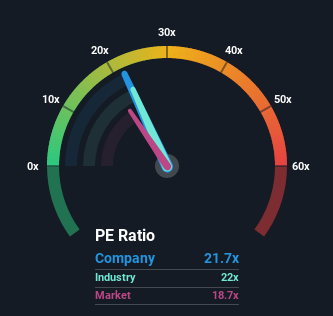- Germany
- /
- Specialty Stores
- /
- XTRA:WEW
Some Westwing Group SE (ETR:WEW) Shareholders Look For Exit As Shares Take 29% Pounding
Unfortunately for some shareholders, the Westwing Group SE (ETR:WEW) share price has dived 29% in the last thirty days, prolonging recent pain. The recent drop completes a disastrous twelve months for shareholders, who are sitting on a 67% loss during that time.
Although its price has dipped substantially, Westwing Group's price-to-earnings (or "P/E") ratio of 21.7x might still make it look like a sell right now compared to the market in Germany, where around half of the companies have P/E ratios below 18x and even P/E's below 10x are quite common. Nonetheless, we'd need to dig a little deeper to determine if there is a rational basis for the elevated P/E.
While the market has experienced earnings growth lately, Westwing Group's earnings have gone into reverse gear, which is not great. It might be that many expect the dour earnings performance to recover substantially, which has kept the P/E from collapsing. You'd really hope so, otherwise you're paying a pretty hefty price for no particular reason.
See our latest analysis for Westwing Group

How Is Westwing Group's Growth Trending?
The only time you'd be truly comfortable seeing a P/E as high as Westwing Group's is when the company's growth is on track to outshine the market.
Retrospectively, the last year delivered a frustrating 61% decrease to the company's bottom line. This has erased any of its gains during the last three years, with practically no change in EPS being achieved in total. Therefore, it's fair to say that earnings growth has been inconsistent recently for the company.
Shifting to the future, estimates from the five analysts covering the company suggest earnings growth is heading into negative territory, declining 20% per year over the next three years. Meanwhile, the broader market is forecast to expand by 16% per year, which paints a poor picture.
With this information, we find it concerning that Westwing Group is trading at a P/E higher than the market. It seems most investors are hoping for a turnaround in the company's business prospects, but the analyst cohort is not so confident this will happen. Only the boldest would assume these prices are sustainable as these declining earnings are likely to weigh heavily on the share price eventually.
What We Can Learn From Westwing Group's P/E?
Westwing Group's P/E hasn't come down all the way after its stock plunged. Generally, our preference is to limit the use of the price-to-earnings ratio to establishing what the market thinks about the overall health of a company.
We've established that Westwing Group currently trades on a much higher than expected P/E for a company whose earnings are forecast to decline. When we see a poor outlook with earnings heading backwards, we suspect the share price is at risk of declining, sending the high P/E lower. Unless these conditions improve markedly, it's very challenging to accept these prices as being reasonable.
And what about other risks? Every company has them, and we've spotted 3 warning signs for Westwing Group (of which 1 is significant!) you should know about.
Of course, you might also be able to find a better stock than Westwing Group. So you may wish to see this free collection of other companies that sit on P/E's below 20x and have grown earnings strongly.
Valuation is complex, but we're here to simplify it.
Discover if Westwing Group might be undervalued or overvalued with our detailed analysis, featuring fair value estimates, potential risks, dividends, insider trades, and its financial condition.
Access Free AnalysisHave feedback on this article? Concerned about the content? Get in touch with us directly. Alternatively, email editorial-team (at) simplywallst.com.
This article by Simply Wall St is general in nature. We provide commentary based on historical data and analyst forecasts only using an unbiased methodology and our articles are not intended to be financial advice. It does not constitute a recommendation to buy or sell any stock, and does not take account of your objectives, or your financial situation. We aim to bring you long-term focused analysis driven by fundamental data. Note that our analysis may not factor in the latest price-sensitive company announcements or qualitative material. Simply Wall St has no position in any stocks mentioned.
About XTRA:WEW
Flawless balance sheet with high growth potential.
Similar Companies
Market Insights
Community Narratives



